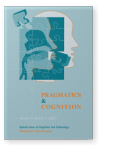A sense of presence
Our apparently simple and basic sense of our own location is, I argue, the fruit of an ongoing project. It is a construct formed by our implicit awareness of our current set of potentials for action, social engagement and intervention. Nonetheless, most attempts at technologically supported telepresence seem shallow and unsatisfying. In what follows, I explore the potential of richer and more varied technologies to impact our fundamental sense of location.
Cited by (3)
Cited by three other publications
Kravchenko, A. V.
2016.
LINGUISTIC EDUCATION IN SCHOOL: ARE WE TEACHING THE RIGHT THING?.
Bulletin of Kemerovo State University :3
► pp. 143 ff.

Kravchenko, Alexander V.
2016.
Language as human ecology: A new agenda for linguistic education.
New Ideas in Psychology 42
► pp. 14 ff.

Brady, Miranda J.
2011.
Subjectivity Through Self-Education.
Television & New Media 12:5
► pp. 441 ff.

This list is based on CrossRef data as of 10 july 2024. Please note that it may not be complete. Sources presented here have been supplied by the respective publishers.
Any errors therein should be reported to them.
